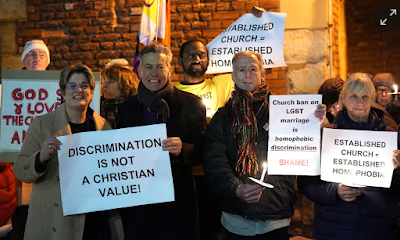Gender Diversity
Gender Diversity is just one part of God’s gloriously varied work of Creation. It brings with it some challenges for those involved but also lovely gifts. Above all, it is another way in which we can share God’s love with one another.
What does it mean to be a transgender or non-binary person?
We are all learning more about how everyone is subtly different in their gender identity and expression. Some people however are clearly transgender, which means they identify differently from the gender they were assigned at birth. This will usually involve them changing their names and the pronouns (she/he/they) by which they are addressed. They may often take hormones, have one or more form(s) of surgery, or take other measures to adjust and live more comfortably and joyfully in their bodies. Some are non-binary people, which means they identify neither as male or female. NB. Some terms used in the past are offensive (including tranny and she-male).
The world’s leading medical and psychological authorities all agree today that being transgender or non-binary is just one way of being human. It is not a mental or other health problem – although, as with other human beings, gender diverse people may have various health needs. Gender identity is not a choice and to imply otherwise to transgender and non-binary people is highly offensive and can be very destructive.
Gender diverse people can be subject to high levels of discrimination, verbal and physical abuse and a lack of understanding from others. The love of God calls us to act very differently!
Gender Diversity and Christian Faith
There have always been gender diverse people, although different times and cultures have understood this in various ways. They can also be found in both the Bible (including some of those termed ‘eunuchs’) and in Christian Tradition. In Matthew chapter 19 for example, Jesus himself spoke positively about different types of such sexually or gender diverse people. Other scriptural passages which especially speak to gender diverse people include Isaiah 56.4-8 (where eunuchs within God’s covenant are promised ‘a monument and name better than sons and daughters’), Psalm 139 (‘fearfully and wonderfully made’), Acts 8.26-40 (the Ethiopian eunuch) and Galatians 3.26-28 (‘nor is there male and female for you are all one in Christ Jesus’). Today gender diverse people can also increasingly be found in all kinds of ministries, including as pastors/priests/Ministers of Word and Sacrament, and their particular experience and insights can be sources of life and fresh understanding of God for us all – like everyone, special creations in the image of God, to be respected, supported, nurtured and celebrated.
What do transgender and other gender diverse people need?
Like all others, gender diverse people come in a wide range of shapes and sizes, with all kinds of backgrounds, interests and experiences. So, as with any other group of people, don’t assume that because you’ve heard about, or even known and journeyed with, one or more transgender person that everyone is the same. Begin by doing as you would with any new person: take time to ask and discover who they are and what they have to say!
Here’s a few tips which are usually likely to be helpful in welcoming and affirming gender diverse people:
• Ask people their name and what gender pronouns (usually she/her/hers – he/him/his – they/them/theirs) they like to be addressed by – and then use them!
• Don’t speculate or ask about body changes and surgeries but do listen and offer support if someone does share something about such things with you
• Encourage them to feel at ease about using whatever bathroom facilities suit them best, and consider whether your church’s facilities could be labelled all gender
• Invite them to join in church life as you would anyone else, including groups and activities which suit the gender(s) they themselves acknowledge
• Don’t expect them to have all the answers to your or others’ gender questions, or to be a spokesperson for gender diversity, but do encourage them to be confident in who they are and in expressing themselves
• Ask what they are interested in and support them in those things
• Pray with them for their and others’ actual needs, not for changes other people might say they need
• Explore how your church may affirm gender diverse people, including with prayers to mark moments of transition and marking events such as the Transgender Day of Visibility (31 March) and Transgender Day of Remembrance (20 November)
• Find out more about God’s gift of gender diversity and help educate others and support changes in church and society which make it easier for gender diverse people to thrive
• And (above all) learn to love them, and to be loved by them, as unique and equal expressions of the love of God.
Further reading and resources
There are an increasing number of helpful Christian and other resources around, including:
• Trans-Gendered: Theology, Ministry, and Communities of Faith by Justin Tanis
• Transfaith: A transgender pastoral resource by Chris Dowd & Christina Beardsley
• This is my body: hearing the theology of transgender Christians, edited by C. Beardsley & M. O’Brien, - produced by The Sibyls - a Christian transgender spirituality and support group.
• A Guide to Including Trans People in your Church by Christina Beardsley & Chris Dowd (to be published by Jessica Kingsley, an imprint of Hachette, 2019)
• austenhartke.com – website (including short video talks) of the young US Christian trans male theologian Austen Hartke (author of Transforming: The Bible and the Lives of Transgender Christians)
• queerlychristian.wixsite.com/transchristianity – website of Avery Smith, a non-binary Catholic-Presbyterian seminarian, tracing gender diversity in scripture and history
• transspirit.org – website of Australian priest Jo Inkpin
• pgdc.org.au – information and resources from Parents of Gender Diverse Children





No comments: